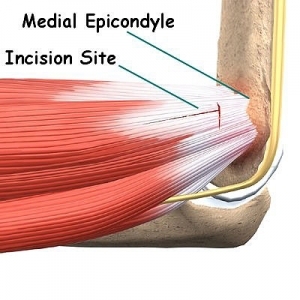Golfers’ Elbow
Medial epicondylitis is soreness or pain on the inside of the lower arm near the elbow. It is commonly called golfer’s elbow.
Causes
The part of the muscle that attaches to a bone is called a tendon. Some of the muscles in your forearm attach to the bone on the inside of your elbow.
When you use these muscles over and over again, small tears develop in the tendons. Over time, this leads to irritation and pain where the tendon is attached to the bone.
The injury can occur from using poor form or overdoing certain sports, such as:
- Golf
- Baseball and other throwing sports, such as football and javelin
- Racquet sports, such as tennis
- Weight training
Repeated twisting of the wrist (such as when using a screwdriver) can lead to golfer’s elbow. People in certain jobs may be more likely to develop it, such as:
- Painters
- Plumbers
- Construction workers
- Cooks
- Assembly-line workers
- Computer users
- Butchers
Symptoms
Symptoms of golfer’s elbow include:
- Elbow Pain that runs along the inside of your forearm to your wrist, on the same side as your pinky finger
- Pain when flexing your wrist, palm down
- Pain when shaking hands
- Weak grasp
- Numbness and tingling from your elbow up and into your pinky and ring fingers
Pain may occur gradually or suddenly. It gets worse when you grasp things or flex your wrist.
Treatment
We can treat this condition with 3-4 sessions of Shockwave Therapy, please call 0404 80005 for more information.
In the mean time:-
- Put ice on the inside of your elbow 3 to 4 times a day for 15 to 20 minutes.
- Take nonsteroidal anti-inflammatory medicines. These include ibuprofen (Motrin, Advil), naproxen (Aleve), or aspirin.
- Do stretching and strengthening exercises. We can suggest certain exercises, or you may have physical.
If your golfer’s elbow is due to a sports activity, you may want to:
- Ask about any changes you can make in your technique. If you play golf, have an instructor check your form.
- Check any sports equipment you are using to see if any changes may help. For example, using lighter golf clubs may help.
- Think about how often you have been playing your sport and if you should cut back the amount of time you play.
- If you work on a computer, ask your manager about making changes to your work station. Have someone look at how your chair, desk, and computer are set up.
- You can buy a special brace for golfer’s elbow at most drug stores. It wraps around the upper part of your forearm and takes some of the pressure off the muscles.

